Five talking points from the World Championships elite men's road race
A memorable end to a great World Championships
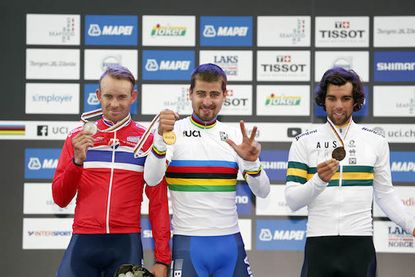
Sagan does it again

When Peter Sagan grows attached to a particular jersey, he does not give it up easily. He first won the maillot vert at the Tour de France in 2012, then went on to reclaim it four more times before that run came to a controversial end last July.
Now, having won yet another World Championships road race title in Bergen, he’ll continue to spend the next 12 months in the rainbow jersey.
His hat-trick of successive Worlds wins (a feat even Eddy Merckx and Marianne Vos could never manage) is all the more impressive considering how the race, by its very nature, changes year-on year. Two years ago in Richmond he won from an attack; last year in Doha he negotiated crosswinds and extreme heat to win from a sprint; this year he again triumphed in a sprint, but this time having survived some selective climbs.
>>> Three in a row: Peter Sagan wins World Championships road race to take his third rainbow jersey
Something about the Worlds seems to suit his particular set of talents in a way that the Spring Classics – which he always animates but does not win as prolifically – do not. Perhaps it’s the way the circumstances seem to enable him to ride far more anonymously.
Whereas we’re used to seeing him constantly animating the Spring Classics by riding at the front and putting his nose to the wind, he was barely spotted once in Bergen, before suddenly emerging in the finishing sprint.
Get The Leadout Newsletter
The latest race content, interviews, features, reviews and expert buying guides, direct to your inbox!
Whatever the reason, it seems unlikely that this will be the last Worlds title of Sagan’s career.
British ride a strong race

Great Britain’s women’s team were one of the major protagonists of Saturday’s road race, with the likes of Hannah Barnes, Dani King and Elinor Barker all putting the hurt on with some powerful attacks.
Although the men’s team didn’t quite possess the same kind of resources in terms of pure talent, they did manage to rally around Ben Swift, and guide him to a very impressive fifth place.
>>> Peter Sagan reflects on 'unbelievable' Worlds win as he dedicates victory to Michele Scarponi
Although half of the team had already abandoned by the business end of the race, the other half were all present at the front of the race protecting Swift on the penultimate lap, with Tao Geoghegan Hart especially visible pulling at the front on the climb.
Their efforts were enough to help Swift remain in contention for the final bunch sprint, who, given the calibre of sprinters he was up against, should be very pleased with such a high placing.
Kristoff nearly delivers fairy-tale home victory
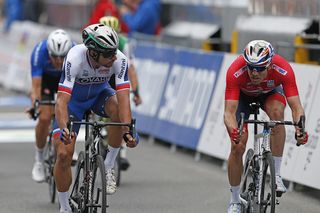
Given the huge numbers of Norwegian fans who have flocked to watch the action in Bergen throughout the week (in huge contrast from last year’s muted affair in Qatar), it would have been a fitting end to these championships to see them rewarded with a home winner.
Alexander Kristoff very nearly did just that, leading out the final sprint until Sagan just about edged him out on the line.
On one hand, Kristoff will be kicking himself for so narrowly missing out on what surely would have been a career highlight, but at least the performance is a sign that he’s back to his best after a slightly off-colour season.
There was more disappointment from the riders who trailed him in the sprint. Michael Matthews (Australia) banged his handlebars in frustration upon finishing third, Matteo Trentin (Italy) had to settle for the unfortunate position of fourth, and Fernando Gaviria (Colombia) didn’t sprint with quite the burst we’ve come to expect from him, down in eighth.
Rising stars nearly upset the favourites

Although a sizeable group remained intact come the last lap, a bunch sprint still seemed far from an inevitability at the time, and indeed some very dangerous attacks were launched on the final ascent of Salmon Hill.
There was a slight surprise in the makeup of that group. Whereas the more firmly-established names of former winners Michal Kwiatkowski (Poland), Philippe Gilbert (Belgium) and 32-year-old Greg van Avermaet (Belgium) had been cited as the riders most likely to put in the most decisive attacks, instead it was the younger pair of Julian Alaphilippe (France) and Gianni Moscon (Italy) who formed a two-man lead group over the summit.
Alaphilippe (aged 25) has shown similar potential for such explosiveness in the past prior to his injury-disrupted 2017, while for Moscon (23) the attack was a further demonstration of how rapidly he is improving following some startlingly eye-catching rides at the Vuelta (even if he was later disqualified for taking a tow from a team car).
They may have been reeled in on the cruelly-long run-in to the finish today, but both look like potential future champions
TV pictures lost at worst possible moment

Fate could hardly have picked a worse moment for the TV coverage to play up, with footage being completely lost as the race entered the final 4km.
For all those who had stuck out for the entire six-and-a-half-hour broadcast, watching for hours in the morning as nothing really happened, it was particularly unfortunate timing, with footage lost just as a tense, tight showdown was playing out between the attackers and the chasing reduced bunch.
With 4km to go we watched Alaphilippe attack Moscon, with Vasil Kiryienka (Belarus) and Lukas Postlberger (Austria) in close pursuit and a chasing bunch a further few seconds behind. When the race reached the fixed camera at the 1km to go mark, however, everything had come back together.
It’ll be possible to gradually piece together exactly what happened, thanks to rider recollections and fan’s amateur footage, which should also put pay to any imaginatively amusing conspiracy theories some might come up with.
It was disappointing not to see the race play out, but the tense wait did at least create a different type of excitement, that didn’t feel too dissimilar from being stood waiting at the roadside.

Thank you for reading 20 articles this month* Join now for unlimited access
Enjoy your first month for just £1 / $1 / €1
*Read 5 free articles per month without a subscription

Join now for unlimited access
Try first month for just £1 / $1 / €1
Stephen Puddicombe is a freelance journalist for Cycling Weekly, who regularly contributes to our World Tour racing coverage with race reports, news stories, interviews and features. Outside of cycling, he also enjoys writing about film and TV - but you won't find much of that content embedded into his CW articles.
-
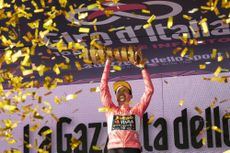 What is the Giro d'Italia's Intergiro competition, and will we even care?
What is the Giro d'Italia's Intergiro competition, and will we even care?The Giro aims to liven up proceedings with an Eighties throwback
By James Shrubsall Published
-
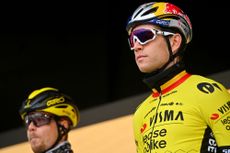 From 'best condition ever' to 'worst' - Wout van Aert reflects on crashing out of Classics
From 'best condition ever' to 'worst' - Wout van Aert reflects on crashing out of ClassicsVisma-Lease a Bike rider rues his misfortune in team documentary after Spring campaign wiped out by crash
By Tom Thewlis Published
-
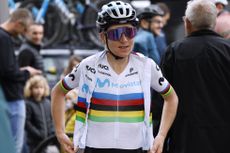 Annemiek van Vleuten to target Vuelta-Tour-Giro treble again next season
Annemiek van Vleuten to target Vuelta-Tour-Giro treble again next seasonThe Dutchwoman plans to retire at the end of 2023
By Tom Davidson Published
-
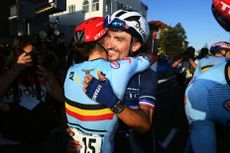 11 of the best photos from the 2022 Road World Championships
11 of the best photos from the 2022 Road World ChampionshipsThere were tears, hugs and kisses in Wollongong, Australia
By Tom Davidson Last updated
-
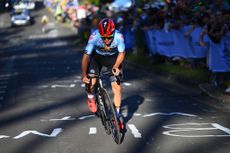 Remco Evenepoel goes long to win the men's World Championships road race solo after stinging attack
Remco Evenepoel goes long to win the men's World Championships road race solo after stinging attackThe young Belgian was clearly the strongest on the day, but others need to ask themselves how and why they let him go
By Jack Elton-Walters Last updated
-
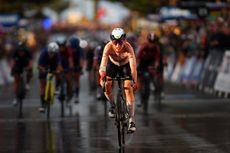 Annemiek van Vleuten soars to victory in World Championships road race despite broken elbow
Annemiek van Vleuten soars to victory in World Championships road race despite broken elbowThe Dutch rider took the second road world title of her career with late attack
By Tom Davidson Last updated
-
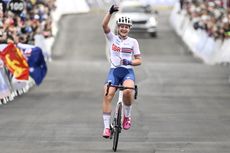 Zoe Bäckstedt retains junior road race title with stunning solo ride at World Championships
Zoe Bäckstedt retains junior road race title with stunning solo ride at World ChampionshipsThe Welsh rider celebrated her 18th birthday with a 58km solo attack and another rainbow jersey
By Tom Davidson Last updated
-
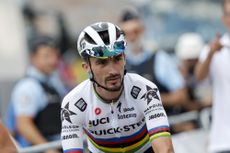 Julian Alaphilippe says he is 'not the sole leader' for France in the World Championships road race
Julian Alaphilippe says he is 'not the sole leader' for France in the World Championships road raceThe Frenchman played down his form in an interview with L'Équipe
By Tom Davidson Published
-
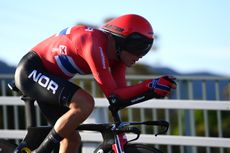 Tobias Foss shocks the favourites to win World Championships time trial
Tobias Foss shocks the favourites to win World Championships time trialThe Norwegian claimed the biggest win of his career, while Filippo Ganna finished in seventh
By Tom Davidson Last updated
-
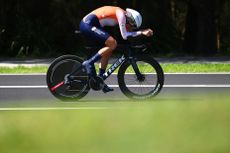 Ellen van Dijk claims third time trial title at World Championships
Ellen van Dijk claims third time trial title at World ChampionshipsThe Dutchwoman won by almost 13 seconds ahead of Grace Brown
By Tom Davidson Last updated